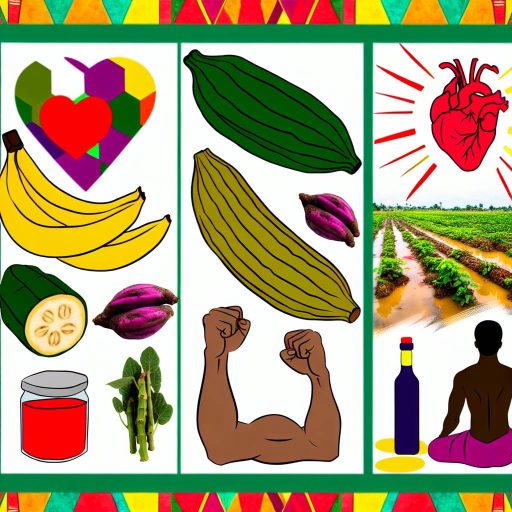Introduction
Incorporating minerals into the daily diet is crucial for overall health.
This is especially true for wellbeing in Nigeria.
Essential minerals like calcium, iron, zinc, and magnesium play key roles.
These minerals support various bodily functions effectively.
Ensuring adequate intake of mineral-rich foods helps prevent deficiencies.
This also supports optimal health over time.
Identify key mineral deficiencies in Nigeria
- Iron deficiency affects many children and adults in Nigeria.
- The World Health Organization links over 60% of maternal deaths in Nigeria to iron deficiency anemia.
- Iron is crucial for producing red blood cells and transporting oxygen.
- Zinc deficiency is also common in Nigeria, especially among children.
- The Nigerian Micronutrient Survey shows that over 70% of children under five suffer from zinc deficiency.
- Zinc supports immune function, growth, and development.
- Inadequate zinc leads to poor immune response and stunted growth in children.
- Calcium deficiency is a significant concern in Nigeria.
- Women and the elderly are especially affected by low calcium intake.
- Many Nigerian women have low bone mineral density.
- Calcium is essential for bone health, muscle function, and nerve transmission.
- Addressing calcium deficiency prevents osteoporosis and bone-related diseases.
Importance of addressing mineral deficiencies through dietary strategies
- Including mineral-rich foods in your diet improves overall health.
- It helps prevent and alleviate mineral deficiencies.
- This approach boosts immunity and enhances body function.
- Minerals support cognitive function, energy, and muscle contraction.
- Adequate mineral intake enhances mental clarity and physical endurance.
- Minerals are key for growth, development, and body system functions.
- Children and adolescents especially need essential minerals for bone and hormonal health.
- Correcting mineral deficiencies lowers the risk of chronic diseases.
- These diseases include cardiovascular disease, diabetes, and osteoporosis.
- Dietary strategies improve quality of life and overall health outcomes.
Mineral-Rich Foods in the Nigerian Diet
List of commonly consumed foods in Nigeria that are rich in essential minerals
- Leafy Greens: Vegetables such as ugwu (fluted pumpkin) are rich in iron.
- Leafy Greens: Waterleaf contains calcium and other minerals.
- Leafy Greens: Spinach is high in iron and calcium.
- Beans: Varieties like black-eyed peas are high in magnesium.
- Beans: Cowpeas offer potassium and iron.
- Nuts and Seeds: Groundnuts (peanuts) provide zinc and magnesium.
- Nuts and Seeds: Sesame seeds are rich in phosphorus.
- Nuts and Seeds: Pumpkin seeds pack zinc and magnesium.
- Fish: Fish from Nigeria’s coastal regions supply iodine and selenium.
- Fish: These fish also provide omega-3 fatty acids.
- Whole Grains: Millet offers manganese and phosphorus.
- Whole Grains: Sorghum is a staple rich in mineral content.
- Whole Grains: Brown rice contains selenium and phosphorus.
Nutritional Information on these foods
- Leafy Greens: 100g of ugwu provides approximately 5mg of iron.
- It also provides 70mg of calcium per 100g.
- Beans: 100g of black-eyed peas offers about 2.6mg of iron.
- It also contains 300mg of magnesium and 278mg of potassium per 100g.
- Nuts and Seeds: A 30g serving of groundnuts contains 1.3mg of zinc.
- It also has 57mg of magnesium and 153mg of phosphorus.
- Fish: A 3-ounce serving of mackerel supplies 7.1mcg of iodine.
- It further provides 31mcg of selenium and 1.5g of omega-3 fatty acids.
- Whole Grains: 100g of millet offers 1.6mg of manganese.
- It contains 285mg of phosphorus and 20mcg of selenium per 100g.
Ways to include these foods in daily meals
- Leafy Greens: Add ugwu to soups for extra minerals.
- Stir-fry spinach with garlic to enhance flavor and nutrition.
- Include waterleaf in salads as a mineral-rich boost.
- Beans: Prepare moi moi (bean pudding) as a protein-packed meal.
- Try ewa agoyin (spicy beans) for a tasty mineral-rich dish.
- Nuts and Seeds: Snack on roasted groundnuts for added minerals.
- Sprinkle sesame seeds on salads to increase mineral content.
- Add pumpkin seeds to smoothies for a mineral boost.
- Fish: Grill or bake fish like mackerel or catfish.
- Incorporate these fish into stews for a nutritious meal.
- Enjoy fried fish as a delicious mineral-rich option.
- Whole Grains: Cook millet or sorghum as a side dish.
- Use brown rice in pilafs to boost mineral intake.
- Make snacks like popcorn with whole grains for a mineral-rich treat.
Explore Further: Balanced Nigerian Diet Plans for Adequate Minerals
Traditional Nigerian Recipes for Mineral Intake
Traditional Nigerian cuisine is not only flavorful but also packed with essential minerals.
These minerals are crucial for overall health and well-being.
Here are some nutrient-dense and mineral-rich recipes you can incorporate into your daily diet.
- Egusi Soup: This traditional soup is made with melon seeds, spinach, and other vegetables.
- Health Benefits: Egusi soup is rich in iron important for blood production and zinc that supports immune function.
- How to Prepare: To make Egusi soup, blend melon seeds, cook with vegetables and your choice of protein, season to taste, and serve with eba or pounded yam.
- Okra Soup: Okra soup is a popular Nigerian dish made with okra, palm oil, and assorted meats.
- Health Benefits: Okra soup is high in potassium which helps regulate blood pressure and magnesium that supports bone health.
- How to Prepare: To prepare Okra soup, chop okra, cook with palm oil, meats, and spices, simmer until thickened, and serve with fufu or rice.
- Beans Porridge: This hearty dish is made with beans, tomatoes, onions, and palm oil.
- Health Benefits: Beans porridge is high in protein which is essential for muscle growth and repair.
- How to Prepare: To cook Beans porridge, soak beans, boil until tender, add chopped vegetables, palm oil, seasonings, and cook until flavors meld together.
Incorporating these traditional Nigerian recipes into your daily diet helps ensure adequate intake of essential minerals.
This supports your overall health and well-being.
Try different recipes, flavors, and ingredients to keep your meals exciting and nutritious.
Uncover the Details: Nutrient-Rich Diet Plans for Nigerians’ Health
Mineral supplements play a crucial role in addressing deficiencies.
Unlock the Power of Nigerian Food Minerals
Discover personalized Food Advisory tailored to boost your health or business using expert insights on Nigerian minerals.
Get StartedDeficiencies may arise due to inadequate dietary intake.
Benefits of Mineral Supplements
- Helps in meeting the daily requirements of essential minerals.
- Can provide a quick and convenient solution to mineral deficiencies.
- Supports overall health and well-being by filling nutrient gaps.
- May improve specific health conditions related to mineral deficiencies.
Limitations of Taking Mineral Supplements
- Excessive intake of certain minerals can be harmful to health.
- Supplements may not always be well-absorbed by the body.
- Costly option compared to obtaining minerals from food sources.
- Not a substitute for a balanced and nutrient-rich diet.
Guidelines for Supplementing with Minerals
- Consult with a healthcare provider or nutritionist before starting any supplement regimen.
- Choose high-quality supplements from reputable brands to ensure safety and efficacy.
- Consider supplementing only when unable to meet mineral needs through diet alone.
- Follow recommended dosages and avoid mega-dosing to prevent toxicity.
Mineral supplements can be a valuable tool in maintaining optimal mineral levels.
They should be used judiciously and with a balanced diet for best results.
Find Out More: Mineral-Rich Diet Plans Tailored for Nigerians

Factors that can affect mineral absorption in the body
- Phytic acid: Found in grains and legumes, it can bind with minerals and reduce their absorption.
- Oxalic acid: Present in leafy greens like spinach, it can inhibit the absorption of minerals like calcium.
- High fiber intake: Too much fiber can interfere with mineral absorption by binding to minerals in the gut.
- Age-related changes: As we age, our bodies may become less efficient at absorbing certain minerals.
- Medications: Some medications can interfere with mineral absorption, such as proton pump inhibitors for acid reflux.
Tips on how to maximize the absorption of minerals from food
- Pair iron-rich foods with vitamin C-rich foods to enhance iron absorption, like adding bell peppers to beans.
- Soak or sprout grains and legumes to reduce phytic acid content and improve mineral bioavailability.
- Cook vegetables lightly to preserve mineral content, as overcooking can lead to nutrient loss.
- Consume fermented foods like yogurt and kefir to promote gut health and enhance mineral absorption.
- Include sources of healthy fats like nuts, seeds, and avocados in your meals to aid in fat-soluble vitamin absorption.
Lifestyle changes or dietary habits that can enhance mineral absorption
- Stay hydrated: Drink an adequate amount of water throughout the day to support proper mineral absorption.
- Manage stress: Chronic stress can impact digestion and nutrient absorption, so practice stress-reducing activities.
- Get enough sleep: Lack of sleep can disrupt hormone balance and affect mineral metabolism in the body.
- Incorporate probiotic foods like sauerkraut and kimchi to improve gut health and optimize mineral absorption.
- Avoid excessive alcohol consumption, as it can impair the absorption of essential minerals like magnesium and zinc.
By following these tips and making simple adjustments to your diet and lifestyle, you can maximize mineral absorption from the foods you eat and support overall health and well-being.
Gain More Insights: Sample Diets for Mineral Balance in Nigerian Cuisine
Strategies for Meeting Mineral Needs in Daily Diets
Daily diet strategies can help Nigerians meet their mineral needs effectively.
It is crucial to prioritize mineral-rich foods for optimal health benefits.
Incorporating a variety of foods like leafy greens, nuts, and seeds can ensure adequate mineral intake.
Seeking advice from a nutritionist or healthcare provider helps tailor diets to specific mineral needs.
Proper mineral intake plays a vital role in maintaining overall health and well-being.




